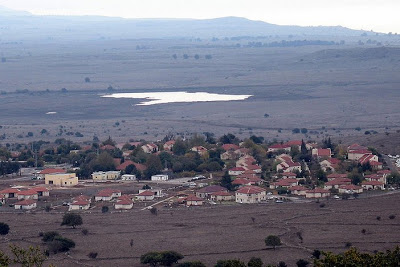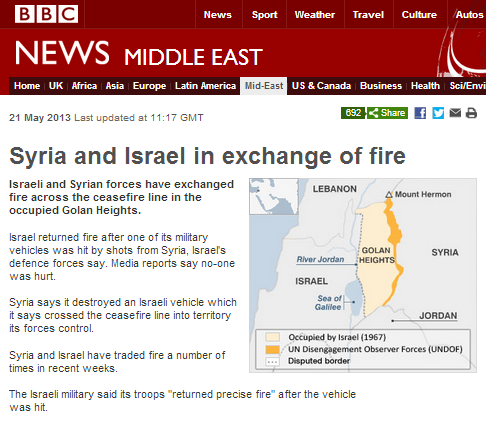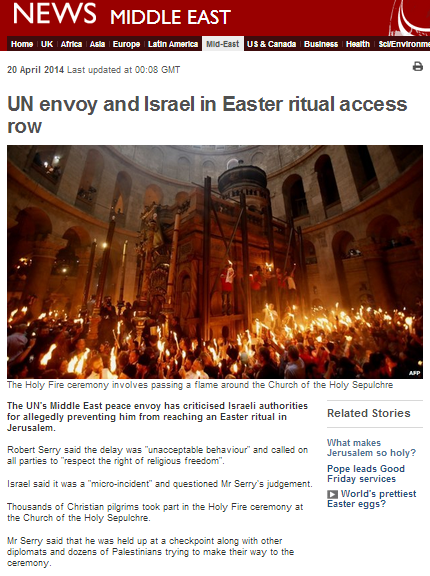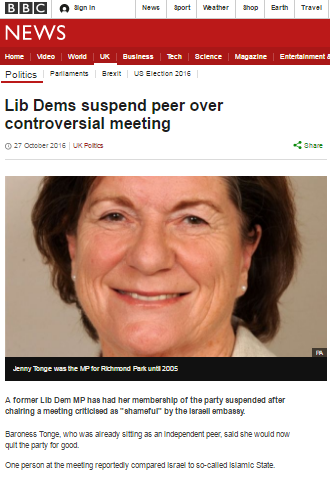An article entitled “Syria and Israel in exchange of fire” appeared on the Middle East page of the BBC News website on May 21st2013.
If readers of the article were expecting to find out what actually happened in this latest incident, they would be disappointed. The report presents the story in terms of conflicting claims – and yet again undiluted Syrian regime propaganda is presented to readers without any effort having been made on the part of the BBC to verify its claims.
Neither the headline nor the leading paragraph makes the chronology of events clear.
“Israeli and Syrian forces have exchanged fire across the ceasefire line in the occupied Golan Heights.”
Only in the second paragraph do readers learn that the Israeli fire was a response to Syrian actions.
“Israel returned fire after one of its military vehicles was hit by shots from Syria, Israel’s defence forces say. Media reports say no-one was hurt.”
However, what this report does not state is that the attack which prompted the Israeli response was in fact the third such incident of cross-border shooting in the same location in three consecutive days.
“IDF Spokesperson’s Unit reported Tuesday that gunfire from Syria hit an IDF unit in the Golan Heights, as had occurred on the two previous nights. No injuries were reported, but a patrol jeep was damaged.
The IDF retaliated by firing a Tamuz missile that destroyed the post from which the shots were fired.
The IDF estimated that due to a recurring pattern of gunfire from the same Syrian area, directed at the same Israeli target and executed at roughly the same time at night, the gunfire was not the result of unintentional overspill and decided therefore to fire back.”
The BBC report, however, omits the fact that repeated shootings took place at the same location and depersonalises their targets.
“Syria and Israel have traded fire a number of times in recent weeks.”
“Syrian gunfire has hit the Israeli-occupied Golan Heights in two previous incidents this week, without causing injury. There have been sporadic exchanges of fire between the two sides in recent months.”
What the BBC terms “sporadic exchanges of fire” are in fact twelve recorded incidents in the past three months: an average of one a week.
Repeating claims made in an official statement by the Syrian Armed Forces broadcast on Syrian state TV, the BBC report states:
“Syria says it destroyed an Israeli vehicle which it says crossed the ceasefire line into territory its forces control.”
“A statement from the Syrian army said it had “destroyed an Israeli vehicle with everything that it had in it”. The statement said the vehicle was shot after it crossed the ceasefire line and headed towards the rebel-held village of Bir Ajam.
It warned that any attempts to violate its sovereignty would be “met with immediate and firm retaliation”.”
There is, of course, no evidence to back up those claims. The three consecutive bouts of gunfire were shot at Israeli soldiers travelling in a vehicle carrying out a routine patrol (which would be familiar to the Syrian army units in the area) along the Israeli side of the border fence.
The fact that the BBC uncritically parrots the Syrian propaganda to its readers without making any attempt to confirm the accuracy of its claims does not represent impartiality, but a failure to meet BBC editorial standards of accuracy.
Also interesting is the fact that the BBC report fails to point out to readers the significance of this official Syrian claim of responsibility for the cross border attack – the first time such an admission has been made since the beginning of the civil war in Syria.
Ironically – given the BBC’s blind rush to promote the Assad regime’s propaganda just days ago – the report states:
“Syrian President Bashar al-Assad has previously accused Israel of aiding the rebels, but has not provided substantive evidence.”
The article includes the observation:
“Syrian shells have hit Israeli positions on the Golan Heights, though it is unclear whether they were aimed at rebels in border areas, and Israel has returned fire.”
In order for that sentence to be accurate, its last part would have to read “and Israel has on some occasions returned fire” and its first part would refrain from the use of the word “positions” – which suggests exclusively military targets – whereas in fact a significant proportion of the mortar shells fired from Syria have been directed towards civilian communities. 
Under the definition of “public purposes“, the BBC pledges the following:
“BBC viewers, listeners and users can rely on the BBC to provide internationally respected news services to audiences around the world and they can expect the BBC to keep them in touch with what is going on in the world, giving insight into the way people live in other countries.”
It defines its priorities as being:
“Build a global understanding of international issues:
a) Provide international news broadcasting of the highest quality.
b) Enable individuals to participate in the global debate on significant international issues.
Enhance UK audiences’ awareness and understanding of international issues.”
The blind promotion of the propaganda of a ruthless dictatorship without any effort being made to verify its claims, and without any attempt to engage in critical thinking, does not serve the purpose of building “understanding of international issues” – quite the opposite in fact. If BBC audiences are interested in reading the Assad regime’s propaganda, they can do so on its official state news websites. From the BBC, licence fee payers expect journalism which will help them look beyond that propaganda.





